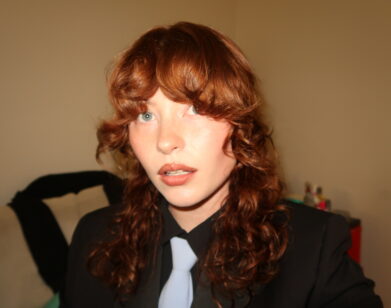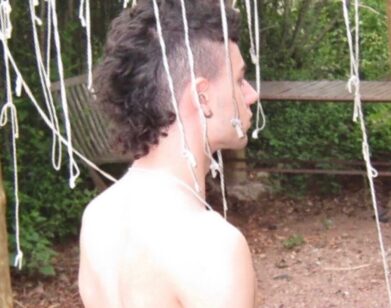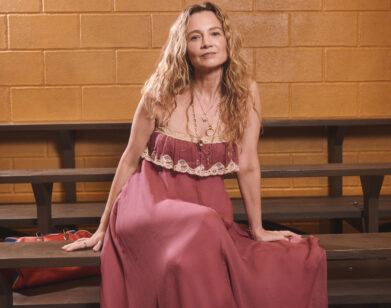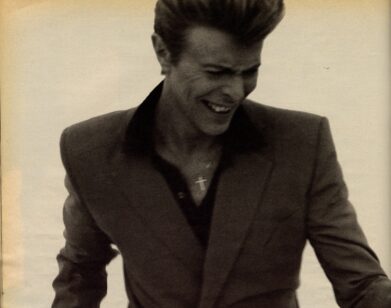American Splendor
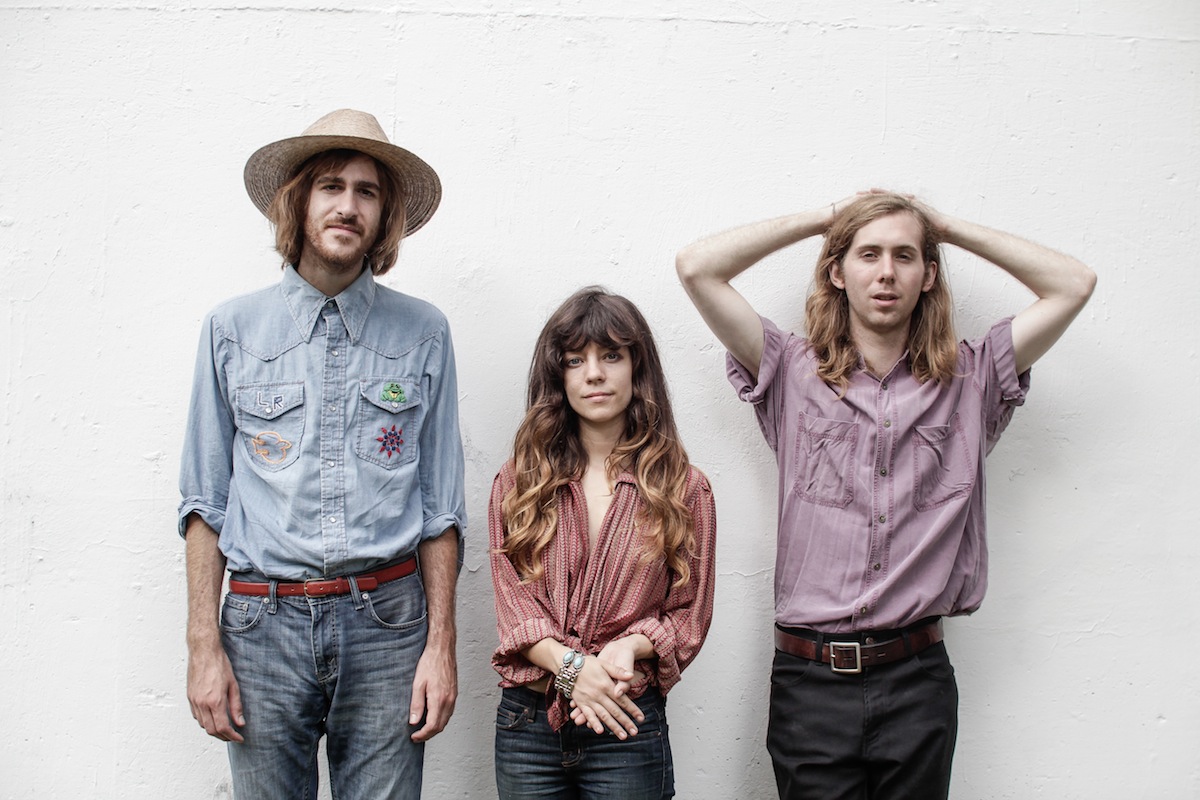
ABOVE: QUILT. PHOTO COURTESY OF ALLISON PHARMAKIS
As its name might imply, psych-folk outfit Quilt’s sound is tough to unravel down to a singular thread. But a line from the trio’s own “Just Dust” sums it up best: “I am not self-contained.” The trio’s latest release Held in Splendor is anything but a static object—it bursts with bombastic harmonies, kaleidoscopic reverb, and enchanting rhythms. The record spills from every corner, the songs embodying an all-encompassing feeling that flows through your ears and directly into your heart.
Vocalists and multi-instrumentalists Anna Fox Rochinski, Shane Butler, and John Andrews draw from myriad disciplines and varied musical backgrounds—Rochinski grew up singing classical choral songs, while Butler’s upbringing found him attuned to spirituality and hymns in song—to compose Quilt’s amorphous songs. It’s their self-proclaimed openness to sound in all of its messy, gorgeous forms that makes Quilt’s music shimmer.
We chatted with the band about the genius of Youtube sidebars, singing Alanis Morissette, and why karaoke can be terrifying.
PAULA MEJIA: What does the word “splendor” mean to you?
ANNA FOX ROCHINSKI: I was in a bookstore, looking at a bunch of art books. A lot of them had the word splendor in them. I think the phrase “held in splendor” is such an appropriate way to title our album—a document of that feeling, I suppose, being suspended.
SHANE BUTLER: It’s a similar word to bliss—when I think of bliss, I don’t necessarily think of joy. But it’s a full feeling, whether that’s a deep sadness that produces a joy of sorts, or a visceral, fullness of splendor. I find it to be the awe of feeling.
MEJIA: I read that you wrote many of these songs during an intense winter. How did those conditions reflect on the music?
BUTLER: The snow was crazy in Boston! It was unbelievable. All this public transportation was shut down for two days. There was this moment where the entire city shut down and everyone acted so differently during that time. We started demoing a lot, and for two days everyone was kind of left in this stupor.
ROCHINSKI: I was definitely anticipating the spring as a time when the record would be made, and it was just a natural progression of the holed-up feeling of winter and working on things really hard because you have no other choice. We have this awesome practice space, and a lot of the songs were written over almost two years. The writing is indicative of parts of many years of writing, but we made it in the spring and it was the perfect time for it to just explode outwards.
BUTLER: We could use the silly metaphor that we snowed in ourselves with all this different material over the years, and February and April was being the plow and creating these roads with everything we’ve accumulated. [laughs]
MEJIA: How does it feel to go back and listen to these songs now, after the fact?
BUTLER: I really love listening to the songs, but I’m really excited to record our next album! We recorded it in April, so it’s been a long time. We have a lot of material brewing, each of us do. By the end of the recording process this time around I felt like we were getting to another place both with each other and as artists. And that got me so excited about writing.
MEJIA: What did you grow up listening to?
ROCHINSKI: I loved The Beatles, oldies radio station, I had it going all the time as a kid. That was a reality I was crafting for myself—from when I was maybe five until I was 11, that’s all I was into in a major way. By the time high school was rolling around, I remember going through a big Jeff Buckley phase, also The Magnetic Fields, Cat Power, Belle & Sebastian. Old folk and blues music, too, in college.
BUTLER: My parents were always big, big music fans. I grew up listening to a lot of Bob Dylan, Neil Young, stuff like that. My father was huge into the Smashing Pumpkins and Nirvana, which had a huge effect on me. I kept listening to a lot of classics and punk, post-punk, garage in high school. I remember hearing Devendra Banhart’s Rejoicing in the Hands in high school and thinking, this is so good! And finding all the bands surrounding that, and getting into more experimental folk.
I think all of us in this band are very open musically. We all love classic rock, too. And one of the things about classic rock bands is that they have this all-encompassing sound—you can’t give them one kind of definition. I’ve always been attracted to bands that are like that.
ROCHINSKI: I also have a very soft spot in my heart for classical music, because I grew up singing classical and choir music when I was a kid. I loved listening to classical radio or going to a performance occasionally. I went to see the Messiah at Jordan Hall last year in Boston, and it was amazing. It was a small baroque symphony and it was beautiful. That’s such an important thing for me to do that every now and then—it reinvigorates that part of my brain. I also grew up on a ton of jazz. My dad is a jazz guitarist, and I have a very strong love for all kinds of jazz music.
BUTLER: Also along with all of that, I’ve got a huge thing for hymnals and spiritual music. That’s been a huge thing for me. And channeling those kinds of vocals. YouTube has been great for that lately, because you can find things on there you’d never think would be online, live recordings of hymnals. Deep-cut searches of hymnals I couldn’t find anywhere else.
MEJIA: I didn’t even know those existed.
ROCHINSKI: YouTube has literally everything. That’s so insane to me, that you can find any footage of anything and it’s incredible.
MEJIA: It’s become this living, breathing digital archive.
ROCHINSKI: It’s so user-friendly—it’s like the most voluntary kind of television watching you could possibly do. It’s great, but it’s really changed the landscape.
BUTLER: I find myself treating it like a record store for super obscure stuff, too. I never had record stores around where I lived growing up—but I find myself getting that experience by clicking link to link. With the really small pressings of music you can find on there, it’s definitely expanding a lot of people’s musical vocabulary.
ROCHINSKI: YouTube gives you these sidebars with infinite possibilities, and it’s empowering in a way! Specifically listeners and music fans. It’s brilliant. It’s really helpful for emerging bands, this insane web of musical connections that never ends. It’s intense.
BUTLER: It becomes a whole sharing culture too, which is really interesting. It’s also funny how it makes music non-linear. I can jump into this private press, ’40s gospel record and then watch a dude with a synthesizer in his room to this old cassette that got up. It’s insane how these all mediums are uploaded to one platform, which makes the fluidity of time and music so much different.
ROCHINSKI: The culture of ownership has changed too. The “hard to find” thing is just a byproduct of the media saying “limited press,” and YouTube just shatters that. Why is it necessarily better that a song is buried under mainstream media? I find that conversations about minor and major labels and selling out are really changing. That to me is the landscape we are in right now— a very topsy-turvy one, that our generation has had a large part of creating.
BUTLER: The landscape of chaos.
MEJIA: Our generation too is the last to remember all of those mediums—cassettes, 8-tracks, vinyl—and to understand how digital mediums have impacted music.
ROCHINSKI: Shane and I are in our mid-20s, and our generation lucked out. I kind of equally experienced records, cassettes, CDs—I remember when my family got a CD player and that was a big deal. Then middle school rolls around, and Napster and mp3s come out! Now it’s the re-commodification of the object of vinyl in this reissue land. I’m not worried about the next generation—whether it’s healthy or unhealthy—but kids have their own little worlds like we did in high school. The teenagers are the ones creating that culture on their own.
BUTLER: Just like with any technology, there comes great responsibility. We all just have the responsibility to use it well.
MEJIA: What was the first CD or cassette that you went out and bought?
ROCHINSKI: I remember when I was 10, I said one day: I am going to go get Jagged Little Pill on CD. And I did.
BUTLER: Alanis?
ROCHINSKI: Yeah, Alanis! I listened to it about five million times in fifth grade, and I still love that album. I heard a rumor she’s turning it into a Broadway musical, but I’m not sure about that…
MEJIA: Whoa.
BUTLER: Ha! I wonder what the set is going to be like for “Ironic.”
ROCHINSKI: Probably everything will be upside down.
BUTLER: My first tape was Third Eye Blind. I spun that so much.
MEJIA: The first CD I ever bought, I think, was Baby One More Time.
ROCHINSKI: Oh my god. I remember that! I remember this kid, Ben, talking about Britney Spears in the fifth grade.
BUTLER: I still play Britney Spears at all of our soundchecks.
ROCHINSKI: Shane also has this nervous tic where he’ll sing “Hit Me Baby (One More Time)” in a monotone voice. It’s cool. Maybe one day you’ll be lucky enough to hear him do it in real life.
MEJIA: Or even better: at karaoke. What are your songs of choice?
ROCHINSKI: I did Mandy Moore’s “Candy” at karaoke—for my first time ever—in D.C. not too long ago. There were only two people there, and I was more nervous to do karaoke than I am to play shows. I’m not kidding. I was kind of scared. Just thinking about it right now is kind of giving me anxiety.
BUTLER: My favorite ones are classics. I really like singing The Clash. Everyone in that band was awesome, but the drummer? That guy rules. When I do karaoke I like to get full into character. That’s how you win at karaoke!
ROCHINSKI: You know what it is? The big, blue fuzzy things they put on those mics. There’s just something not right about them.
HELD IN SPLENDOR IS OUT TOMORROW, JANUARY 28, AND QUILT WILL PLAY ROUGH TRADE IN BROOKLYN ON FEBRUARY 28. FOR MORE ON THE BAND, PLEASE VISIT ITS FACEBOOK PAGE.

